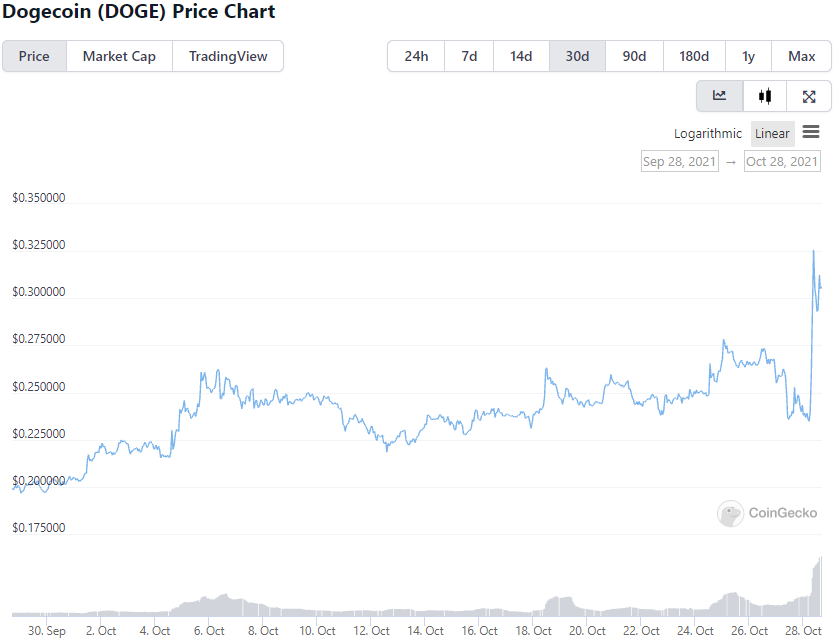Popular trading platform Robinhood has dipped below its IPO price for the first time following the announcement that the company had experienced an unexpected drop in revenues from cryptocurrency trading. The decline has served to expose the company’s dependence on crypto, but optimism remains that Robinhood’s relationship with digital currencies will deliver more success in the future.
The numbers revealed when Robinhood announced its revenue decline was stark. The platform’s cryptocurrency trading revenue fell from $451 million in Q2 to $267 million in Q3 of 2021.
Shares in Robinhood (NASDAQ: HOOD) were sent falling by some 8.47% on the night its quarterly results statement was revealed, falling to a price of $39.57. The following day saw the value of the stock fall below $35.
At the time of writing, shares have dipped underneath Robinhood’s IPO price for the first time since its debut in late July 2021. Investors using the Robinhood app to trade crypto were revealed to have generated just $51 million of revenue in Q3 of 2021. This represents a vast drop compared to the $233 million generated in Q2.
Despite the negativity surrounding Robinhood’s fundamentals, it’s worth noting that the platform enjoyed steady progress on 2020, reporting a 35% year-on-year boost to net revenue amounting to $365 million. Although this figure was also significantly lower than Q2 of 2021, which stood at $565.
While some analysts are warning that the downturn may be due to growing competition in the cryptocurrency investing market, other respectable investors remain bullish over the long term prospects of the embattled brokerage.
On a recent company earnings call, Robinhood CEO Vlad Tenev confirmed that the company has been aiming to exercise caution regarding its cryptocurrency offerings. “We’re going to be very careful,” Tenev explained, citing regulatory scrutiny over the company. This implies that the company aims to enhance its offering once free of SEC scrutiny, potentially offering a range of new cryptocurrencies for investors to buy and sell.
Looking to Robinhood’s Dip as a Buy Opportunity
ARK Investment Management, run by Cathie Wood, used Robinhood’s dip as an ideal buying opportunity to stock up on more shares in the company – indicating that the firm believes that Robinhood’s long-term prospects still remain bright.
Two ARK ETFs bought more than 836,000 shares in Robinhood, worth a total of at least $32.4 million in the days leading up to the company’s Q3 earnings report. After the release of the report, ARKK added a further 1,728,431 shares to its portfolio with a fund weighting of around 0.28%, according to a trade notification at the time.
The ARKW fund, which invests heavily in technologies associated with the ‘next-generation internet’ added 320,211 shares the day after the announcement, amounting to a total of 2.2 million shares purchased in the wake of Robinhood’s downturn and more than 3 million in the space of a week.
Maxim Manturov, head of investment research at Freedom Finance Europe, shares a similarly bullish outlook for Robinhood despite its stock market downturn.
“Robinhood’s long-term prospects remain positive. Even with these short-term concerns, Robinhood is well placed to create long-term value,” Manturov explained.
“It is important to note that real interest rates in the US have been negative for an extended period. Real interest rates will likely remain negative even after the (likely) Fed rate hike in 2022. This is important because negative real rates contribute to higher trading and speculative activity in asset markets. To maintain their purchasing power despite the negative rates, the Americans will be looking to generate income from stocks, cryptocurrencies, precious metals and other investments, and trading instruments. This is good news for Robinhood, which has positioned itself as the preferred trading platform for young investors.”
Reasons for Optimism at Robinhood
The end of October hasn’t been filled with bad news only for Robinhood. The platform’s upcoming cryptocurrency wallet has built a waiting list of more than 1 million people.
The introduction of a dedicated cryptocurrency wallet alongside the platform will enable users to gain more control over their holdings. They’ll also have the ability to send and receive cryptocurrency in a more seamless manner, enabling a greater level of functionality which could help the platform to regain some significant ground over their competitors.
Interestingly, JPMorgan Chase data has revealed that much of Robinhood’s cryptocurrency rally of Q2 2021 was driven by the rise of Dogecoin, a dog-themed meme currency that’s found vocal support from the world’s richest man, Elon Musk.
Data suggests that DOGE accounted for a massive 61% of the cryptocurrency transaction revenue of Robinhood in Q2 of 2021, indicating that investor enthusiasm for the so-called meme coin was a significant factor behind the company’s strong fundamentals in the summer.

(Image: CoinGecko)
Although building a dependency on such a volatile meme coin is highly unlikely to be a sustainable way of safeguarding your growth, it’s certainly worth acknowledging that, buoyed by the success of another dog-themed coin in Shiba Inu, Dogecoin has undergone a strong rally in Q4 of 2021 so far, in a run that could see investors recapture their enthusiasm for cryptocurrency investing on Robinhood.
Although it’s certainly too early to tell, Robinhood’s embattled Q3 may be consigned to the history books if the cryptocurrency market’s bullish Q4 continues to grow. However, in the chaotic and volatile world of crypto, anything’s possible.
